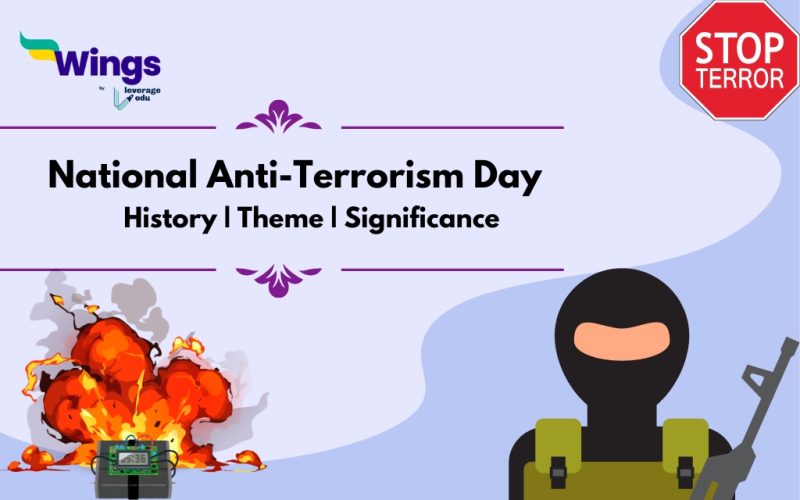Every year India celebrates National Anti-Terrorism DAY on May 21. It commemorates the assassination of India’s former Prime Minister Rajiv Gandhi. He was also the youngest Prime Minister who achieved such great success at the age of 40. Rajiv Gandhi was assassinated by a member of the Liberation Tigers of Tamil Eelam on 21 May 1991, at Sriperumbudur, a small village near Madras. Therefore, the VP Singh government announced May 21 as the day dedicated to paying tribute to and honouring the dedication, hardwork, and perseverance of Rajiv Gandhi towards India.
| Name of the day | National Anti-Terrorism Day |
| Observed on | May 21 |
| Reason | To commemorate the assassination of Rajiv Gandhi |
| Aim | To increase awareness about terrorism and promote unity and peace among citizens to combat terrorism effectively. |
History of National Anti-Terrorism Day
- It was in 1991 when the former seventh Prime Minister of India, Rajiv Gandhi, was assassinated and killed in a terrorist campaign in Tamil Nadu.
- He was assassinated by an LTTE terrorist who belonged to a militant separatist group fighting for an independent homeland for the Tamils in the northern and eastern provinces of Sri Lanka.
- As a result, India faced a sudden and huge shock.
- This prompted the then government, under V.P. Singh to officially announce National Anti-Terrorism Day on May 21.
The Pledge
Additionally, there is a pledge that is proposed to be taken in all government centres, offices, public institutions, and public sector undertakings. You can find the pledge below along with the ‘Observance of National Anti-Terrorism Day’ PDF, signed by the Joint Secretary to the Government of India, below.

Source: Government of India PDF
Also Read: World Turtle Day 2024- History & Significance
What is the Significance of National Anti-Terrorism Day?
National Anti-Terrorism Day is an important day in India because it urges people to be vigilant and careful in their daily lives. It spreads the message of peace and encourages people to put aside their differences and coexist peacefully.
- It helps us understand the significance of keeping social peace.
- Anti-Terrorism Day is observed on May 21, the day Rajiv Gandhi, India’s former Prime Minister, was assassinated.
- On National Anti-Terrorism Day, people pay tribute to Rajiv Gandhi and recall his contributions to education.
Must Read: What is the Full Form of ATS?
What is the Objective of Anti-Terrorism Day?
- The main objective of National Anti-Terrorism Day is to make a clear stand against all acts of terrorist actions in the country.
- It also spreads awareness about the anti-social acts of terrorism; while promoting a world of harmony, brotherhood, peace, unity, and humanity.
- As terrorism and all its forms and manifestations not only pose a threat to the safety of citizens but also target international prosperity, peace and stability, Anti-Terrorism Day plays an important role to serve as a reminder to everyone in the country of the country’s tradition of non-violence and tradition.
It is important to note that this global threat persists beyond borders, and can manifest beyond any religion, race, or gender. Therefore, there is a need for the international community to take a stand to tackle this challenge on this day.
Must Read: National Investigation Agency: Mission, Offices, Jurisdiction
How to Celebrate National Anti-Terrorism Day?
How is Anti-Terrorism Day observed in the country? The following are some examples:
- Seminars, discussions, and debates are held at the national and state level to combat terrorism.
- An official pledge is taken to promote unity and national tolerance.
- Moreover, schools and organizations and many people also conduct ceremonies to take pledges and observe a two-minute silence at 10 a.m. on May 21 to pay respect to those who lost their lives to terrorism.
- Social media campaigns are also conducted at various scales to spread awareness and motivate people to participate in the discourse and take a stand against it.
- Another form of solidarity is shown through Candlelight vigils.
Major Terrorist Attacks in India
Some of the major terrorist attacks that shook India are mentioned below.
| Date | Terrorist Attack |
| 26 November 2008 | 26/11 Mumbai attack |
| 18 September 2016 | Uri Attack |
| 29 October 2005 | Delhi Bomb Blasts |
| 11 July 2006 | Series of Mumbai Train Bombings |
| 13 May 2008 | Jaipur Blasts |
FAQs
National Anti-Terrorism Day is on May 21 in India.
Former Prime Minister of India, Rajiv Gandhi’s death anniversary is marked on anti-terrorism day.
The anti-terrorism law in India is the Unlawful Activities (Prevention) Act, 1967 (UAPA).
For more information about such informative articles, check the trending events page of Leverage Edu.
 One app for all your study abroad needs
One app for all your study abroad needs













